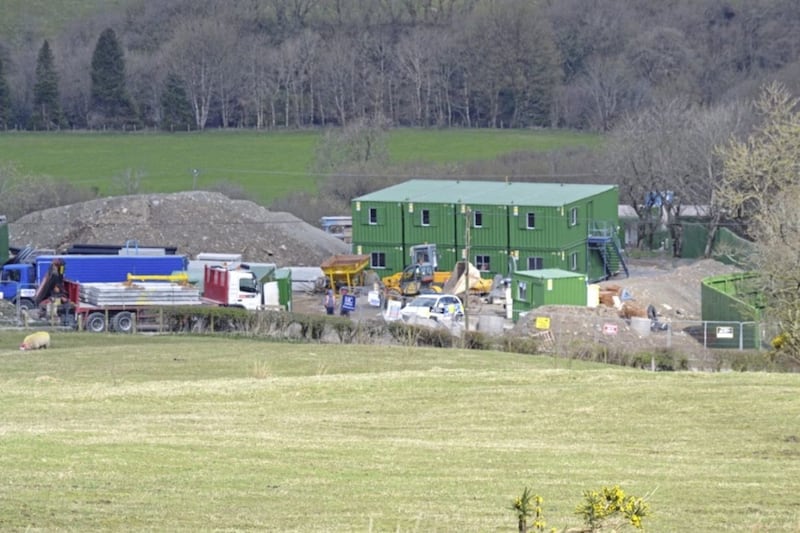A Tyrone goldmine firm has dismissed a report which accuses police of failing to adequately investigate a series of incidents against environmental campaigners.
A report published by the Committee on the Administration of Justice (CAJ) points to a catalogue of alleged investigative failures by the PSNI in relation to objectors to a proposed goldmine in the Sperrin Mountains.
The report, Policing the Protectors: A Narrative Report of PSNI Policing of Environmental Protest in the Sperrins, does not directly name the US firm Dalradian Gold, which has developed a mine and associated processing plant at Greencastle, near Omagh.
However, Dalradian has reacted to the report. A spokesman said: “Regarding the allegations the report is based on, the ‘CAJ has not verified any of the allegations reported to us, and therefore none of the allegations have been proven to be true’.
“The report does, however, highlight formal investigations and court processes in response to the actions of some individuals. Unfortunately, our experience is that a small, unrepresentative number of people do not respect the right of our employees to go about their lawful business safely and without hindrance.
“Instead, they have sought to intimidate staff and make unsubstantiated allegations about them and the project. Among other things, a number of these individuals have been convicted of offences of harassment, criminal damage and aggravated trespass regarding their behaviour towards Dalradian employees and at Dalradian sites.”
Also responding to the report, the PSNI said the document does not give sufficient weight to both sides of the dispute.
“We are ... concerned that the report, focusing as it does on just the ‘protectors’ allegations, fails to give sufficient consideration to rights of everyone involved in this issue and the wider context of the protest,” PSNI Superintendent Robert McGowan said.
Tensions in the district have been raised for several years with different views locally over the mine proposals.

In the report launched on Tuesday, human rights group CAJ set out concerns by campaigners, described as “protectors”, that reports of alleged assault, harassment and intimidation, “have not been adequately investigated as criminal conduct, resulting in a lack of trust and confidence in policing”.
The report also points out that by contrast protectors are concerned that allegations of criminal activity against them are “allegedly swiftly investigated”.
“This has led to a perception that the police are not impartial,” the report states.
While the report authors say that they cannot “independently verify” if “allegations happened”, in compiling the report the CAJ has drawn on information from subject access requests to the PSNI, video footage and “victim testimony”.
Among the issues raised were “several harassing phone calls” received by a campaigner in 2017 and 2019.
During one contact in 2019 a “protector allegedly received a phone call in which the caller spoke about putting the protector’s children in bin bags”.
The report suggests that police later left a voicemail “in relation to the matter being reported to the Public Prosecution Service”, however it was unclear if this related to the threatening phone call or claims of an assault that took place when the protector allegedly attempted to confront the person said to be responsible for the calls.
CAJ say the PPS took a decision not to prosecute “due to an insufficient amount of evidence”.
According to the report, in the following days police “allegedly informed” three ‘protectors’ they received “credible threats” against their lives and it alleged that officers did not provide any information about where the threats came from and how they were delivered.
CAJ has confirmed that officers informed at lest one protector of the “viable threat”.
The report also deals with “allegations the PSNI unduly sought to deter protectors from taking part in lawful expressive protest activities”.
The document also has a section dealing with “criminalising of the protectors” citing multiple incidents were campaigners have faced criminal charges.
Some of those pursued through the courts were later cleared, the report confirms.
In its conclusions CAJ say that “patterns that have emerged” from the testimony of protectors “do give cause for concern regarding practices in the policing of environmental protests in the Sperrin Mountains, particularly regarding the proportionality of the policing response and questions of different treatment”.
Eliza Browning, Senior Policy Officer, CAJ who led the research said “there are issues of concern in many parts of the world regarding how environmental protestors are policed, this report shows we are no different”.

James Orr, Director of Friends of the Earth said “it is essential we rebalance environmental protection away from serving corporate interests towards the interests of communities and the earth itself”.
PSNI Superintendent Robert McGowan said the CAJ report “covers an important and sensitive issue for the local community” and that police have “been involved in responding to these protests for several years”.
“All incidents - regardless of who reported them - were investigated and sent to the PPS for their direction,” he said.
“As such we do not recognise the central allegations of the ‘protectors’ set out in this report - that PSNI did not adequately investigate offences reported to them as crimes by protectors or that PSNI had unduly sought to deter protectors from taking part in lawful expressive protest activities.”
“We encourage anyone with a complaint about PSNI actions to contact the Police Ombudsman.”
Superintendent McGowan said police are “mindful of our role to facilitate any lawful exercise of freedom of expression while ensuring the rights of all persons are protected”.
He added: “We are therefore also concerned that the report, focusing as it does on just the ‘protectors’ allegations, fails to give sufficient consideration to rights of everyone involved in this issue and the wider context of the protest.
“There has been significant criminal activity (e.g. thousands of pounds of damage) and disruption as a result of this dispute.
“The requirement to consider the human rights of everyone involved is a key factor in any policing response.”








